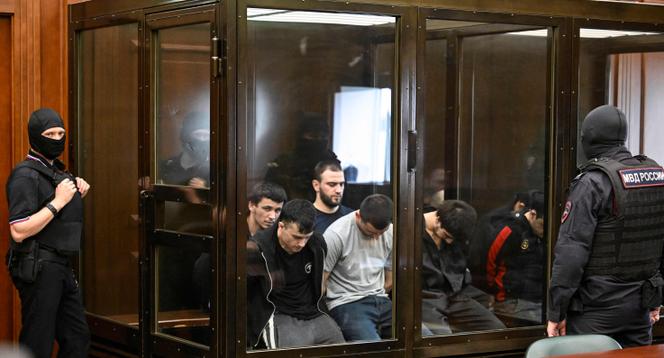


Nineteen people went on trial in Moscow on Monday, August 4, over an attack on a city concert hall that killed 149 people in one of the deadliest strikes in Russia. Armed men stormed the Crocus City Hall on the outskirts of Moscow on March 22, 2024, opening fire and then setting the building alight, injuring hundreds of people. The Islamic State (IS) group claimed responsibility.
The four suspected attackers, all from Tajikistan – an ex-Soviet republic in central Asia – and another 15 people accused of being accomplices have gone on trial. An Agence France-Presse (AFP) reporter at the courtroom saw some of the defendants in glass cages, their hands cuffed behind their backs. Around 30 survivors were also present.
One of them, Tatiana Ruzanova, told AFP she came to the court to see the defendants. "They all sit quietly with their heads slumped in cages (...) I didn't see if they felt guilty, they all had their heads down," Ruzanova said. On the night of the attack, she came to the concert of the Russian rock group Piknik with a friend but did not make it inside the hall. "We saw everyone already in the foyer, maybe that saved us. We inhaled smoke. It was a miracle that we didn't make it," Ruzanova said.
Subsequent hearings are to take place on Tuesday and Thursday, according to the court's website. The judge ordered the trial to proceed behind closed doors. The attack shocked Russia, which has been battling Ukraine in a military offensive since February 24, 2022. Despite IS claiming responsibility, Russia implicated Ukraine in the attack, an allegation that Kyiv called baseless and absurd.
The massacre ignited a debate about the reintroduction of the death penalty. Some hardline politicians publicly called for a moratorium, observed since 1996, to be lifted. It also sparked a wave of xenophobia against Central Asian migrants in Russia.
Nearly half of the victims were killed by smoke and carbon monoxide inhalation from the fire that broke out, rather than from gunshot wounds, the state TASS news agency reported on Sunday, citing case materials. Ekaterina Klimenko, who survived the attack, told AFP she hoped for a "fair decision" from the judges. "I still go to concerts, but intuitively I look around with my eyes to see if there is any danger," she said.
